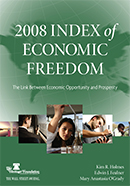UPDATE 2:
The U.N.’s North Korea Chutzpah
Wall Street Journal, Page A17
Melanie Kirkpatrick
6/12/2008
UPDATE 1:
Cash for Kim
Wall Street Journal, page A20
6/3/2008
(Excerpt) You have to read to page 347 of yesterday’s report on the United Nations Development Program’s antics in North Korea before reaching the recommendation that is likely to cause a panic in Turtle Bay: Give member states access to the internal audits, now secret, of UNDP programs.
That simple principle – let the funders see how their money is spent – is anathema in the international aid community and was at the heart of the U.S. exposé last year of the UNDP’s slipshod operations in North Korea. If the U.S. hadn’t blown the whistle, it would be business as usual. This latest report – by three experts appointed by the UNDP – is a wake-up call for more accountability throughout the U.N.
In yesterday’s report, the auditors write that they “are unable to confirm the total size” of the UNDP program in North Korea between 1997 and 2007 – an amazing indictment of UNDP financial practices. They calculate total expenditures between $57.1 million and $72.3 million, which roughly accords with what the U.S. had estimated and far exceeds the UNDP’s guess.
Where did all this money go? The auditors conclude that 38% of disbursements were to “government agencies.” Its review of “selected” projects finds that the documentation for 77 projects – or 74% – was so poor that they could not determine “whether the ultimate beneficiary is consistent with the payee name indicated in the financial system.” That is, nobody knows where the money went – except perhaps Kim Jong Il.
Also notable is the report’s findings on dual-use technology. Of the 151 pieces of equipment reviewed by the auditors, 95 were on the U.S. Commerce Department’s control list and required an export license. Many were “controlled by the U.S. for national security and anti-terrorism reasons . . . and were of heightened concern.” The UNDP hadn’t obtained the required licenses. The auditors add that when the UNDP pulled out of North Korea in March 2007, it left this equipment behind. The UNDP failed to obtain the required “retransfer authorization,” the report dryly notes. Translation: Retrieval was impossible because the North already had the stuff.
ORIGINAL POST: A three-member UN investigative committee, led by Miklos Nemeth, a former Hungarian prime minister, issued a report claiming allegations that North Korea diverted aid money from the United Nations Development Program are not supported by the evidence.
From the New York Times:
There was no sign that millions of dollars were mismanaged, diverted elsewhere or unaccounted for, the report said, countering accusations made in early 2007 by the United States Mission to the United Nations. Although the report acknowledged that some information the panel had sought was unavailable, the review’s conclusion was that the money had been “used for the purposes of the projects.”
The controversy surrounding the accusations led the development program to suspend its operations in North Korea in March 2007. They have remained suspended because of differences over whether the government should choose local employees who work for the agency.
The report, which surveyed the disbursement of more than $23 million between 1999 and 2007, recommended that the development program pay closer attention when it adapts its general guidelines to “a challenging environment” like North Korea. The dense 353-page report appeared to concur with what the program had maintained all along, that the American allegations were baseless. But it recognized some sloppy practices, like tossing $3,500 in defaced counterfeit $100 bills into the bottom of its safe in Pyongyang and forgetting about them for more than a decade.
Here is the report (hat tip DPRK Studies)
Here is some background information from the UNDP.
Here is the Washington Post coverage.
Here are the initial findings from a US Senate report (detailing the accusations). Here is the initial UNDP response (preceding the above report).
Read the full NY Times article here:
North Korea Didn’t Dupe U.N. Office, Report Says
New York Times
Neil MacFarquhar
6/3/2008

 The
The